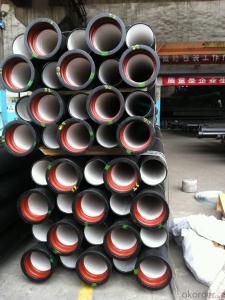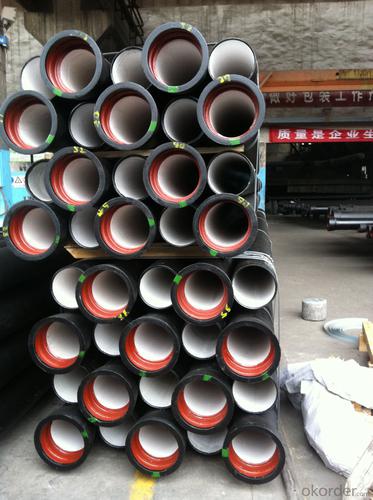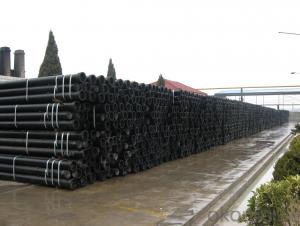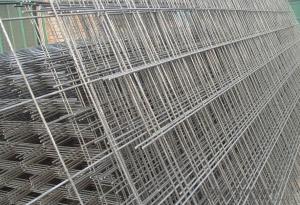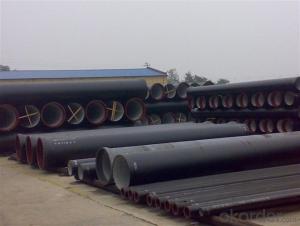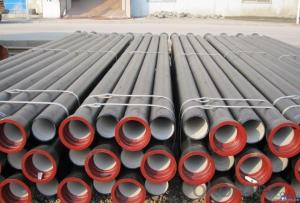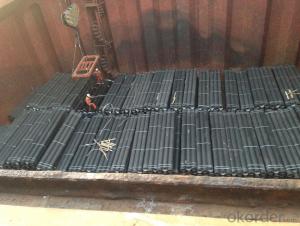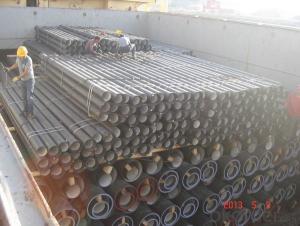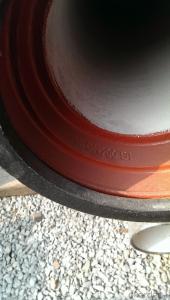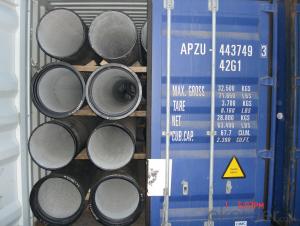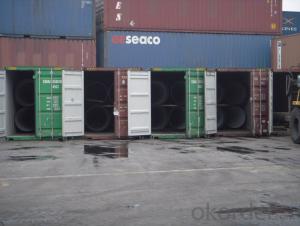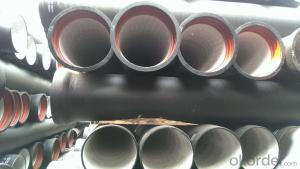DUCTILE IRON PIPE K8 DN150 SOCKET SPIGOT
- Loading Port:
- Tianjin
- Payment Terms:
- TT OR LC
- Min Order Qty:
- 25 m.t
- Supply Capability:
- 30000 m.t/month
OKorder Service Pledge
OKorder Financial Service
You Might Also Like
1) The standard of pipe: ISO2531:1998, EN545:2006,K9 K8
2) Effective length: 6m/5.7m
3) Inner cement line: Portland cement lineas per ISO4179
4) Zinc coating: at least 130g/m2 as per ISO8179
5) Bitumen painting: at least 70μm as per ISO8179
6)With 102% quantity of NBR, SBR, or EPDM ring asper ISO4633
7) DN80-DN1200
8) Highstrength, lighter than grey iron, good corrosion resistance, no furring, smallflow resistance, easy fixing, long life tome about 100 yeas
9)Checked by automatic inspection equipment
10) Composition:
Chemical composition | |||
Chemical composition | Ductile Cast Iron Pipe (%) | Grey iron pipe (%) | Steel pipe (%) |
C | 3.5-4.0 | 3.2-3.8 | 0.1-0.2 |
Si | 1.9-2.6 | 1.4-2.2 | 0.15-0.4 |
Mn | 0.15-0.45 | 0.4-0.6 | 0.3-0.6 |
P | ≤0.06 | ≤0.3 | 0.02-0.03 |
S | ≤0.02 | ≤0.1 | 0.02-0.03 |
Mg | 0.03-0.06 |
|
|
11) Feature:
Mechanical properties | |||
| Ductile Cast Iron Pipe | Grey Iron Pipe | Steel Pipe |
Tensile Strength(Mpa) | ≥420 | 150-260 | ≥400 |
Yield Strength(Mpa) | ≥300 | No Confirmation | No Confirmation |
Bending Strength(Mpa) | ≥590 | 200-360 | ≥400 |
Elongation (%) | ≥10 | Neglected | ≥18 |
Brinell Hardness(HBS) | ≤230 | ≤230 | About 140 |
12) T type mechanical joint
13) Packing: in bulk or container
PACKING: 1) Pipesare bundled together with the steel belt.
2) Wooden pieces are put between the pipes.
- Q: What is the lifespan of ductile iron pipes?
- The lifespan of ductile iron pipes can vary depending on various factors such as the quality of the pipes, the installation conditions, and the environment in which they are used. However, on average, ductile iron pipes have a lifespan of around 50 to 100 years. This makes them a durable and long-lasting option for water and sewer infrastructure. With proper maintenance and regular inspections, ductile iron pipes can continue to function effectively and efficiently for several decades. It is important to note that factors like corrosion, soil conditions, and water chemistry can impact the lifespan of these pipes, so monitoring and addressing these issues can help extend their lifespan.
- Q: How does ductile iron pipe handle soil movements and settlements?
- Ductile iron pipe has excellent resistance to soil movements and settlements due to its high tensile strength and flexibility. The pipe's ability to withstand soil loads and settle without compromising its structural integrity makes it a reliable choice for underground applications. Additionally, the pipe's joint design allows for some degree of movement, further reducing the risk of damage or failure.
- Q: Can ductile iron pipe be used for hot water applications?
- Yes, ductile iron pipe can be used for hot water applications. It has excellent heat resistance and can withstand high temperatures, making it suitable for conveying hot water in various plumbing systems.
- Q: How do ductile iron pipes handle soil movement?
- Ductile iron pipes are renowned for their exceptional strength and durability, rendering them highly adept at managing soil movement. These pipes are engineered to withstand the external loads and pressures arising from soil settlement, ground shifting, or other environmental elements. A significant characteristic of ductile iron pipes lies in their flexibility. Unlike inflexible materials such as cast iron or concrete pipes, ductile iron pipes possess a certain degree of elasticity, enabling them to endure soil movement without succumbing to cracks or fractures. This flexibility empowers the pipes to absorb the stresses imposed by the soil, effectively preventing any substantial harm to the pipeline system. Furthermore, ductile iron pipes exhibit remarkable tensile strength, allowing them to resist the pulling forces that arise from soil movement. The pipes can endure the expansion and contraction of the surrounding soil, thereby diminishing the likelihood of pipe deformation or failure. Additionally, ductile iron pipes are frequently installed using proper bedding and backfilling techniques to further enhance their capacity to handle soil movement. Adequate bedding materials, such as crushed stone or sand, are utilized to deliver stable support to the pipes and distribute the external loads uniformly. This serves to minimize the impact of soil movement on the pipes and uphold their structural integrity. In conclusion, ductile iron pipes are purposefully designed to proficiently manage soil movement by virtue of their flexibility, high tensile strength, and appropriate installation methods. These pipes can effectively endure the stresses generated by soil settlement, ground shifting, or other soil-related factors, ensuring dependable and long-lasting performance in a variety of environmental conditions.
- Q: What is the expected bedding and backfill requirements for ductile iron pipes?
- The expected bedding and backfill requirements for ductile iron pipes typically involve using a suitable bedding material, such as crushed stone, to provide support and stability to the pipe. This is followed by proper backfilling around the pipe with a granular material, such as sand or gravel, to protect the pipe from external loads and prevent damage. The specific requirements may vary based on factors such as soil conditions, pipe diameter, and depth of installation. It is important to consult relevant standards and guidelines to ensure proper installation and long-term performance of the ductile iron pipes.
- Q: How does ductile iron pipe handle changes in pipe diameter or size?
- Ductile iron pipe is designed to handle changes in pipe diameter or size with relative ease. It possesses excellent flexibility and can accommodate variations in pipe dimensions without compromising its structural integrity. This is mainly due to its unique composition, which includes a significant amount of graphite nodules that provide ductility and elasticity to the material. When faced with changes in pipe diameter or size, ductile iron pipe can be easily manufactured or modified to meet specific requirements. It can be cast or fabricated in various diameters and lengths, allowing for seamless integration and adaptability within a pipeline system. This versatility is particularly beneficial in scenarios where different pipe sizes need to be connected or when the pipeline layout requires alterations. Moreover, ductile iron pipe's superior mechanical properties make it capable of withstanding the stresses and forces associated with changes in pipe diameter or size. It exhibits high tensile strength, impact resistance, and durability, ensuring that it can handle the internal and external pressures exerted on the pipe during operations. Additionally, the jointing systems used with ductile iron pipe contribute to its ability to handle changes in diameter or size. Various joint types, such as push-on, restrained, or mechanical joints, provide secure and leak-free connections between different pipe sections. These joints allow for easy assembly and disassembly, enabling efficient adjustments to the pipe diameter or size as needed. In conclusion, ductile iron pipe is well-equipped to handle changes in pipe diameter or size due to its inherent flexibility, adaptability, and robustness. Its composition, manufacturing capabilities, and jointing systems all contribute to its ability to accommodate variations in pipe dimensions without compromising its performance.
- Q: Are ductile iron pipes suitable for gravity flow applications?
- Ductile iron pipes are indeed suitable for gravity flow applications. This material, known for its strength and durability, can easily bear the weight of water and solid waste flowing through the pipes without encountering any problems. It possesses exceptional tensile strength and can withstand external forces like soil movement or heavy traffic loads without sustaining damage. Moreover, the inner surfaces of these pipes are smooth, ensuring efficient flow and minimal friction losses. Additionally, ductile iron pipes are resistant to corrosion and can last for several decades without necessitating frequent maintenance or replacement. In conclusion, ductile iron pipes are a dependable option for gravity flow applications due to their robustness, longevity, and ability to resist various environmental factors.
- Q: Are ductile iron pipes suitable for bridge crossings?
- Indeed, bridge crossings are well-suited for the utilization of ductile iron pipes. Renowned for their exceptional strength and durability, ductile iron pipes present a dependable option for a wide range of applications, including bridge crossings. These pipes possess the capacity to endure substantial loads and exhibit resistance to corrosion, a particularly vital attribute when considering the challenging environmental conditions that bridge crossings may expose them to. Moreover, ductile iron pipes possess the remarkable ability to flex and withstand ground movement, rendering them an optimal choice for bridge crossings where the ground may experience shifting or settling over time. In conclusion, ductile iron pipes offer the necessary characteristics to guarantee the secure and efficient conveyance of fluids or materials across bridges.
- Q: Can ductile iron pipes be used for water treatment plants?
- Yes, ductile iron pipes can be used for water treatment plants. Ductile iron pipes have excellent corrosion resistance and durability, making them suitable for transporting water in water treatment plants. Additionally, their high tensile strength allows them to withstand the high pressures often found in these facilities.
- Q: Can ductile iron pipes be used for underground water treatment systems?
- Indeed, underground water treatment systems can utilize ductile iron pipes. Renowned for their robustness and longevity, these pipes are well-suited for a range of uses, including underground water treatment systems. They possess exceptional resistance to corrosion, rendering them perfect for transporting water through even the harshest subterranean surroundings. Furthermore, ductile iron pipes boast a remarkable load-bearing capacity, enabling them to withstand the immense pressure and weight exerted by the soil above. Additionally, their versatility allows for simple installation and maintenance, making them a sensible option for underground water treatment systems.
Send your message to us
DUCTILE IRON PIPE K8 DN150 SOCKET SPIGOT
- Loading Port:
- Tianjin
- Payment Terms:
- TT OR LC
- Min Order Qty:
- 25 m.t
- Supply Capability:
- 30000 m.t/month
OKorder Service Pledge
OKorder Financial Service
Similar products
Hot products
Hot Searches
Related keywords
